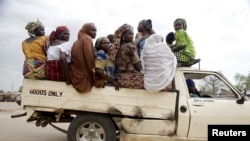On December 12, Reuters published an investigative report that said the Nigerian military has killed thousands of children in its war against Islamist terrorist groups like Boko Haram.
Reuters’ summary of the investigation states:
“More than 40 soldiers and civilians told Reuters they witnessed the Nigerian military kill children or saw children's corpses after a military operation. Estimates totaled in the thousands. Reuters investigated six incidents in which at least 60 died.
“One mother described the deaths of her twin babies: ‘The soldiers said they killed those children because they are children of Boko Haram.’ ”
The report alleging intentional child deaths was one in a three-part series, “Nightmare in Nigeria.” Other installments exposed a “secret, mass abortion program” run by the military and profiled one woman, a former Boko Haram captive, who said she lost two children and was tricked into an abortion.
The Nigerian Defense Headquarters denounced the report in a lengthy post on Facebook:
“The fictitious series of stories actually constitute a body of insults on the Nigerian peoples and culture for, no people or culture in Nigeria practices such evil as dreamt up by the Reuters team …”
Problem is, the overwhelming amount of evidence amassed by the Reuters journalists, including military documents and hospital records, is clearly not “fictitious.”
Reuters said it shared its findings with Nigerian military officials in advance of publication, and commanders denied the existence of the abortion program and targeting children, as the series dutifully reported.
Nigeria has been at war with Boko Haram terrorists and other Islamist fighters in the northeastern part of the country for more than a decade. The ongoing conflict is estimated to have directly killed 40,000 people, mostly civilians, since at least 2009.
The United Nations separately estimated that indirect effects of the fighting had resulted in 350,000 deaths though 2020. Hunger afflicts the conflict region, and millions have been forced to leave for safety and to survive.
Boko Haram is most notoriously known for its 2014 kidnapping of nearly 300 schoolgirls from the village of Chibok. But that is just one of many attacks in which women have been abducted and persecuted. Those who’ve escaped captivity report being subjected to forced labor and marriage, rape, sexual and psychological abuse, and involuntary participation in military operations, rights groups say.
Reuters said the existence of a Nigerian military-run program to terminate the pregnancies of captive women after they are freed has not previously been reported. The goal was to stop the births of more insurgents, the news organization said:
“Since at least 2013, the Nigerian military has conducted a secret, systematic and illegal abortion programme in the country’s northeast, ending at least 10,000 pregnancies among women and girls, a Reuters investigation has found. Many had been kidnapped and raped by Islamist militants. Resisters were beaten, held at gunpoint or drugged into compliance, witnesses say.”
Summarizing the evidence for the program, Reuters said:
“This investigation is based on interviews with 33 women and girls who say they underwent abortions while in the custody of the Nigerian Army. Just one said she freely gave consent. Reporters also interviewed five civilian healthcare workers and nine security personnel involved in the programme, including soldiers and other government employees such as armed guards engaged in escorting pregnant women to abortion sites. In addition, Reuters reviewed copies of military documents and civilian hospital records describing or tallying thousands of abortion procedures.”
Soldiers allegedly lied to the women about medications they were being given:
“The campaign relied on deception and physical force against women who were kept in military custody for days or weeks. Three soldiers and a guard said they commonly assured women, who often were debilitated from captivity in the bush, that the pills and injections given to them were to restore their health and fight diseases such as malaria. In some instances, women who resisted were beaten, caned, held at gunpoint or drugged into compliance. Others were tied or pinned down, as abortion drugs were inserted inside them, said a guard and a health worker.”
The story on child deaths, “Smothered, poisoned and shot,” likewise relied on abundant witness accounts from both victims and perpetrators:
“Soldiers and armed guards employed by the government told Reuters army commanders repeatedly ordered them to 'delete' children, because the children were assumed to be collaborating with militants in Boko Haram or its Islamic State offshoot, or to have inherited the tainted blood of insurgent fathers.
“Intentional killings of children have occurred with a blurring frequency across the region during the war, according to witnesses interviewed by Reuters. More than 40 sources said they saw the Nigerian military target and kill children or saw the dead bodies of children after a military operation. These sources included both parents and other civilian witnesses, as well as soldiers who said they participated in dozens of military operations in which children were slaughtered…
“This report is based on interviews with 44 civilian witnesses with knowledge of killings and disappearances of children. Reuters also interviewed 15 security force members – soldiers, local militia members and armed guards – who said they took part in or observed targeted killings of children.”
Reuters noted that killing civilians in a military conflict is a war crime. Witnesses were frightened into silence, and bodies were buried or burned to cover up what happened:
“The Reuters investigation found that Nigerian soldiers took aim at children of all ages in battlezones around the northeast because the army presumed the children were, or would become, terrorists. Soldiers selected babies and toddlers for killing after rescuing them and their mothers from Islamist militants; rounded youths up for interrogation and killing in raids of homes and marketplaces; or slaughtered children along with adult civilians in counterterrorism operations that were intended to leave no survivors. When commanders ordered towns to be cleared of presumed insurgents, soldiers said they understood, and sometimes were explicitly told, that children’s lives were not to be spared.”
In a statement to Polygraph.info, Reuters said, “Reuters is committed to covering Nigeria in an impartial and independent way, in accordance with our Trust Principles, as we do around the world. We confidently stand by our reporting.”
The Nigerian government has been struggling to combat Boko Haram and other insurgent groups. President Muhammadu Buhari was elected in 2015 on a counterterrorism platform.
There have been past reports alleging Nigerian military abuses in the conflict, including a video that surfaced in May of 2014 showing three Nigerian soldiers executing civilians thought to be part of Boko Haram or sympathizers.
In recent months, the government of neighboring Niger said 40 Boko Haram fighters had been killed on islets of Lake Chad. The Nigerian army claimed in September 2021 that almost 6,000 Boko Haram fighters had surrendered in recent weeks.
In its rebuttal to Reuters, the Nigerian Defense Headquarters said that between July 2021 and November, more than 82,000 Boko Haram fighters and family members had surrendered. That includes 24,000 women and 41,000 children, the statement said.
“The [northeast] Borno State Government is camping and accommodating them family-by-family, as per households, without having to separate the children from their parents,” the statement said. “In the same camp are thousands of pregnant women and nursing mothers. A total of 262 babies were born within a period of 4 months.”
The government is working to reintegrate rescued and surrendering family members into local communities, the statement said, claiming that nearly 5,000 had done so.
In May, U.N. Secretary-General Antonio Guterres visited a reintegration camp in Borno state and said the region needed more humanitarian help from the international community. The U.N. said 8.4 million people in the region need assistance, with 3.2 million not getting adequate food.
“The people affected by terrorism I met in Borno, Nigeria, want above all to go back home in safety and dignity,” Guterres said. “Borno is now a place of hope – showing that the way to fight terrorism effectively is to invest in livelihoods, reintegration and people's futures.”
But on December 10, a spokesman said Guterres called on Nigerian officials to fully investigate the Reuters report of coerced abortions, and to take “immediate remedial actions and accountability measures” if needed.






